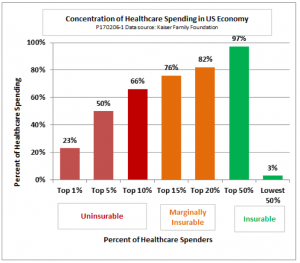
This bar graph shows the percentage of healthcare spending with percent of healthcare spenders.
In the United States, 27.5 million people (8.5% of the US population) do not have health insurance. Among the 91.5% who do have health insurance, 67.3% have private insurance while 34.4% have government-provided coverage through programs such as Medicaid or Medicare (“Pros & Cons – ProCon.org”). Without private and government-provided coverage, many more people would lose their lives. But why is this such as issue when the US can implement a universal healthcare system? Those who argue for a universal healthcare system believe that the benefits of affordable medical services outweigh the negatives.
“Recent studies from the Institute of Medicine (2001, 2003a, 2003b) have shown that lack of health insurance can have a real and adverse impact not only on the amount and quality of care an individual receives but also on longevity and quality of life” (“Pros & Cons – ProCon.org”).”
Benefits of Universal Healthcare
- Save many lives. Based on a study from Harvard researchers, “Lack of health insurance is associated with as many as 44,789 deaths per year in the United States.” (Wilper, 2009). This number of deaths per year is insanely high compared to other countries around the world. With universal healthcare, people would get the services they need to order to prolong and fulfill their life expectancy to the best of their ability.
- Makes medical services affordable for everyone. According to results from a June 7-11 Gallup poll, it showed that when Americans were questioned what they would consider is the most important financial problem facing their family, they reported paying for healthcare (Dugan, 2021). It’s unfortunate that many people skip neglect their medical needs due to the cost of it.
Check This Article Out!
